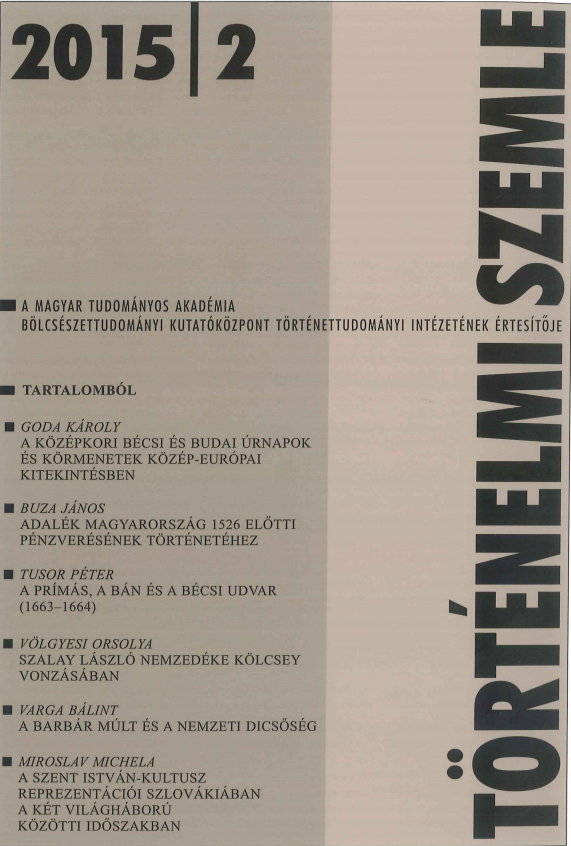A prímás, a bán és a bécsi udvar (1663–1664)
The Primate, the Ban and the Court of Vienna (1663–1664)
Author(s): Péter TusorSubject(s): Christian Theology and Religion, Law, Constitution, Jurisprudence, Military history, Political history, 17th Century
Published by: Magyar Tudományos Akadémia Bölcsészettudományi Kutatóközpont Történettudományi Intézet
Keywords: primate; ban; court of Vienna; 1663-1664; church;
Summary/Abstract: The aim of the study was to examine and analyse in detail, in the framework of a research on the political role of the ecclesiastical estate (status ecclesiasticus), especially in the early modern era, and on the basis of newly discovered sources, the measures taken by its leader, György Lippay, primate of Hungary (1642–1666) in the interest of Miklós Zrínyi, ban (banus) of Croatia (1647–1664) in the court of Vienna during 1663–1664. After 1608, the Hungarian political establishment was characterized by the so-called „dualism of estates”. In practice it meant that the ruler and the estates, or rather their leaders, the palatine and the archbishop of Esztergom, primate of Hungary, exerted political power together. Until the period examined here, primate Lippay was regarded as the main exponent of Habsburg authority in Hungary. From 1663 Lippay, who had previously treated Miklós Zrínyi with mistrust and even as a political opponent, became his determined protector in the court. In the summer of 1663 he not only tried to get reinforcements for Zrínyi-Újvár, but also labored for the dispatch of eight thousand German soldiers under the command of Zrínyi to make him able, together with his own troops and the soldiers of the local Hungarian lords, to start military operations against the Ottomans. While trying to convince in long letters duke Johann Ferdinand Porzia, president of the Secret Council, he also sent to the imperial court his Jesuit confessor, Zakariás Trinkell, provided with detailed instructions, and giving him new information all the time. He also put to work his extensive network of Jesuit connections. The mission of Trinkell was repeated in the middle of August 1664. According to the new instructions of Lippay, which dwelt on the merits and grievances of the ban, Trinkell was given the task of achieving that Zrínyi should be given a convenient commanding post and an independent army in the war against the Ottomans. Yet the imperial court concluded an armistice with the Ottomans already on 10 August 1664 at Vasvár, news of which only reached the Hungarian political leaders late in September. Probably after informally consulting the main representatives of the estates, among them Zrínyi himself, Lippay turned through Trinkell to bishop Christoph Bernard von Galen of Münster, one of the leaders of the Rhenish Alliance, then staying in Vienna, to protest against the peace, which had been made in complete secrecy, and was utterly unfavorable to Hungary. He drew attention to the fact that the agreement was equally injurious to the Empire, and proposed instead the immediate recuperation of Érsekújvár, which had been lost in 1663. It was in the wake of the failure of this hitherto unknown diplomatic mission that the idea of an anti-Habsburg conspiration (the so-called Wesselényi conspiration) came to the fore. 1663, and especially 1664 are turning points in the history of the dualism of estates which had been functioning since 1608. While also shedding light on the relationship between Lippay and Zrínyi, the newly found sources analysed in this study mainly enlighten this turn and, in connection with the approach of the imperial estates in October, its special international aspects.
Journal: Történelmi Szemle
- Issue Year: 2015
- Issue No: 02
- Page Range: 219-250
- Page Count: 32
- Language: Hungarian

